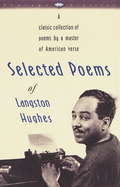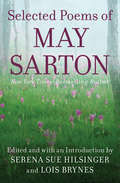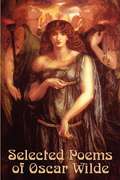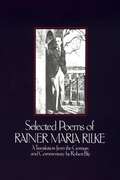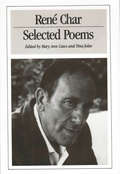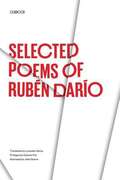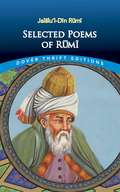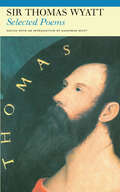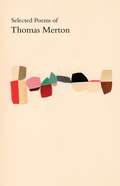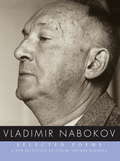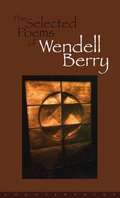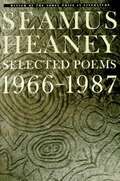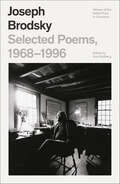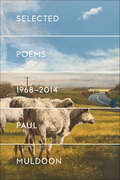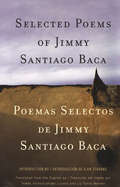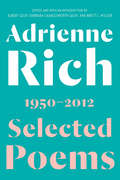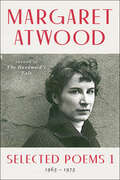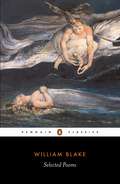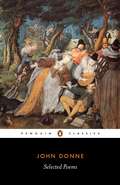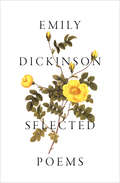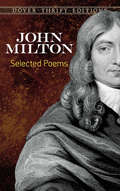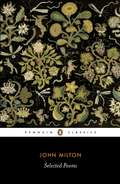- Table View
- List View
Selected Poems of Gopalakrishna Adiga
by Sumatheendra NadigWorks, life and poems of Gopalakrishna Adiga.
Selected Poems of Langston Hughes
by Langston HughesWith the publication of his first book of poems, The Weary Blues, in 1926, Langston Hughes electrified readers and launched a renaissance in black writing in America. The poems Hughes wrote celebrated the experience of invisible men and women: of slaves who "rushed the boots of Washington"; of musicians on Lenox Avenue; of the poor and the lovesick; of losers in "the raffle of night." They conveyed that experience in a voice that blended the spoken with the sung, that turned poetic lines into the phrases of jazz and blues, and that ripped through the curtain separating high from popular culture. They spanned the range from the lyric to the polemic, ringing out "wonder and pain and terror-- and the marrow of the bone of life."The poems in this collection were chosen by Hughes himself shortly before his death in 1967 and represent work from his entire career, including "The Negro Speaks of Rivers," "The Weary Blues," "Still Here," "Song for a Dark Girl," "Montage of a Dream Deferred," and "Refugee in America." It gives us a poet of extraordinary range, directness, and stylistic virtuosity.
Selected Poems of May Sarton: An Anthology Of The Journals, Novels, And Poems Of May Sarton
by May SartonThe comprehensive collection detailing the career of a twentieth-century master In her prolific six-decade career, May Sarton was as at home crafting a novel as she was writing a memoir. However, it was in poetry that Sarton&’s feelings were laid bare. She was a writer of immense creativity and strength, and created a back catalog of poetry that could rival those of any of her contemporaries. In Selected Poems of May Sarton, a collection from her first forty years of writing, many of the author&’s classic themes are on display: There are her meditations on solitude, featuring the breathtaking &“Gestalt at Sixty&”; there is her beautifully written tribute to literature in &“My Sisters, O My Sisters&”; and there is a rumination on affairs of the heart in an excerpt from the sonnet collection &“A Divorce of Lovers.&” Sarton was a true literary force, with the ability to speak to readers of all genders, persuasions, and ages, and Selected Poems of May Sarton demonstrates that power perfectly.
Selected Poems of Nilmaniphookan
by Krishna Dulal BaruaTranslation of Nilmaniphookan's poems in Assamese to English by Krishna Dular Barua.
Selected Poems of Nirala
by M. M. ThakurBy his mastery of the Khari Boli, by his unique individual genius coupled with his powerful historic sense, Nirala ushered in a new kind of idiom in Hindi poetry, enriching the language as no other poet of his time did.
Selected Poems of Oscar Wilde
by Oscar WildeSelected Poems of Oscar Wilde contains the following seventeen poems The Ballad Of Reading Gaol, Ave Imperatrix, To My Wife - With A Copy Of My Poems, Magdalen Walks, Theocritus - A Villanelle, Greece, Portia, Fabien Dei Franchi, Phedre, Sonnet On Hearing The Dies Irae Sung In The Sistine Chapel, Ave Maria Gratia Plena, Libertatis Sacra Fames, Roses And Rue, From 'The Garden Of Eros', The Harlot's House, From 'The Burden Of Itys', Flower of Love. These poems range from early in Wilde's career to his last poem The Ballad of Reading Gaol written about his experience in prison.
Selected Poems of Rainer Maria Rilke: A Translation from the German and Commentary
by Rainer Maria Rilke Robert BlyIn this landmark translation and commentary the National Book Award-winning poet Robert Bly brings his prowess as translator and critic to bear on the work of one of the indisputably major poets of the century.
Selected Poems of René Char
by Mary Ann Caws Rene Char Tina Jolas“This is a fine, bilingual edition of the works of one of the great French Surrealists. . . . The translations, by several hands, serve Char well—full of insinuating rhythms and unusual verbal couplings, they come close to the piercing beauty of the originals.” —Pat Monaghan, Booklist The Selected Poems of René Char is a comprehensive, bilingual overview reflecting the poet’s wide stylistic and philosophical range, from aphorism to dramatic lyricism. In making their selections, the editors have chosen the voices of seventeen poets and translators (Paul Auster, Samuel Beckett, Cid Corman, Eugene Jolas, W.S. Merwin, William Carlos Williams, and James Wright, to name a few), in homage to a writer long held in highest esteem by the literary avant-garde.
Selected Poems of Ruben Dario
by Ruben DarioRubén Darío changed the whole course of Spanish poetry, by converting it to "modernism" and by halting what he called "the mummification of Spanish rhythms. " Exotic, erratic, revolutionary, he was a major poet by any standards. This translation, by a man who is himself a poet, brings to English readers the whole range of Darío's verse-from the stinging little poems of Thistles to the dark, tired lines written at the end of his life.
Selected Poems of Rumi (Dover Thrift Editions)
by Jalalu’l-Din RumiMore than 100 stirring, unforgettable lyrics by the great 13th century Sufi teacher and mystical poet include "The Marriage of True Minds," "The Children of Light," "The Man Who Looked Back on His Way to Hell," "The Ascending Soul," "The Pear-Tree of Illusion," "The Riddles of God," and many others. Translated by R. A. Nicholson.
Selected Poems of Sir Thomas Wyatt: Selected Poems (Fyfield Books)
by Sir Thomas WyattFirst published in 2003. Routledge is an imprint of Taylor & Francis, an informa company.
Selected Poems of Thomas Merton: New Selected Poems Of Thomas Merton
by Thomas MertonPoet, Trappist monk, religious philosopher, translator, social critic: the late Thomas Merton was all these things. This classic selection from his great body of poetry affords a comprehensive view of his varied and progressively innovative work. Selected by Mark Van Doren and James Laughlin, this slim volume is now available again as a wonderful showcase of Thomas Merton’s splendid poetry.
Selected Poems of Vladimir Nabokov
by Vladimir NabokovThough we know Vladimir Nabokov as a brilliant novelist, his first love was poetry. This landmark collection brings together the best of his verse, including many pieces that have never before appeared in English.These poems span the whole of Nabokov&’s career, from the newly discovered &“Music,&” written in 1914, to the short, playful &“To Véra,&” composed in 1974. Many are newly translated by Dmitri Nabokov, including The University Poem, a sparkling novel in verse modeled on Pushkin&’s Eugene Onegin that constitutes a significant new addition to Nabokov&’s oeuvre. Included too are such poems as &“Lilith&”, an early work which broaches the taboo theme revisited nearly forty years later in Lolita, and &“An Evening of Russian Poetry&”, a masterpiece in which Nabokov movingly mourns his lost language in the guise of a versified lecture on Russian delivered to college girls. The subjects range from the Russian Revolution to the American refrigerator, taking in on the way motel rooms, butterflies, ice-skating, love, desire, exile, loneliness, language, and poetry itself; and the poet whirls swiftly between the brilliantly painted facets of his genius, wearing masks that are, by turns, tender, demonic, sincere, self-parodying, shamanic, visionary, and ingeniously domestic.
Selected Poems of Wendell Berry
by Wendell BerryThis is a collection of poems on the lines of themes of earth, marriage, family; work and death weave the 100 poems of this collection together.
Selected Poems, 1966-1987
by Seamus HeaneyCollection by the Nobel Laureate dealing with nature, heritage, the land and the "troubles" of his Northern Ireland home
Selected Poems, 1968–1996 (Penguin Modern Classics Ser.)
by Joseph BrodskyA career-spanning collection of poetry from the Russian American author and winner of the 1987 Nobel Prize for Literature.Joseph Brodsky spent his life advocating for the place of the poet in society. As Derek Walcott said of him, “Joseph was somebody who lived poetry . . . He saw being a poet as being a sacred calling.” The poems in this volume span Brodsky’s career, which was marked by his expulsion from the Soviet Union in 1972. Together, they represent the project that, as Brodsky said, the “condition we call exile” presented: “to set the next man—however theoretical he and his needs may be—a bit more free.”This edition, edited and introduced by Brodsky’s literary executor, Ann Kjellberg, includes poems translated by Derek Walcott, Richard Wilbur, and Anthony Hecht, as well as poems written in English or translated by the author himself. Selected Poems, 1968–1996 surveys Brodsky’s tumultuous life and illustrious career and showcases his most notable and poignant work as a poet.
Selected Poems, 1968–2014
by Paul Muldoon“The most significant English-Language poet born since the second world war.” —The Times Literary SupplementSelected Poems 1968–2014 offers forty-six years of work drawn from twelve individual collections by a poet who “began as a prodigy and has gone on to become a virtuoso” (Michael Hofmann). Hailed by Seamus Heaney as “one of the era’s true originals,” Paul Muldoon seems determined to escape definition, yet this volume, compiled by the poet himself, serves as an indispensable introduction to his trademark combination of intellectual hijinks and emotional honesty. Among his many honors are the Pulitzer Prize for Poetry and the Shakespeare Prize “for contributions from English-speaking Europe to the European inheritance.”“Among contemporaries, Paul Muldoon, one of the great poets of the past hundred years, who can be everything in his poems—word-playful, lyrical, hilarious, melancholy. And angry. Only Yeats before him could write with such measured fury.” —Roger Rosenblatt, The New York Times
Selected Poems/Poemas Selectos
by Ilan Stavans Jimmy Santiago Baca Tomás H. Lucero Liz Fania Werner"Baca writes with unconcealed passion . . . and manifests both an intense lyricism and that transformative vision which perceives the mythical and archetypal significance of life events."--Denise Levertov Champion of the International Poetry Slam, winner of the Before Columbus American Book Award, the International Hispanic Heritage Award, the Pushcart Prize, and the prestigious International Award, Jimmy Santiago Baca has been writing as a mestizo (part Native American, part Mexican) and an outsider ever since he learned to read and write--in English--during a six-year Federal prison sentence when he was in his twenties. Drawing on his rich ethnic heritage and his life growing up in poverty in the Southwestern United States, Baca has a created a body of work which speaks to the disenfranchised by drawing on his experiences as a prisoner, a father, a poet, and by reflecting on the lush, and sometimes stark, landscape of the Rio Grande valley. In response to increased demand for Latino poetry in Spanish, and to thousands of Baca fans who are bilingual, this unique collection contains Spanish translations of Baca's poetry selected from the volumes Martín and Mediations on the South Valley (1987), Black Mesa Poems (1989), Immigrants in Our Own Land (1990), Healing Earthquakes (2001), C-Train and Thirteen Mexicans (2002), Winter Poems Along the Rio Grande (2004), and Spring Poems Along the Rio Grande (2007).
Selected Poems: 1950-2012 (Salmon Poetry Ser.)
by Adrienne Rich Albert Gelpi Barbara Charlesworth Gelpi Brett C. MillierSixty years of poems from pioneering writer, activist, and intellectual Adrienne Rich—“the Blake of American letters” (Nadine Gordimer). Adrienne Rich was the singular voice of her generation, bringing discussions of gender, race, and class to the forefront of poetical discourse. This generous selection from all nineteen of Rich’s published poetry volumes encompasses her best-known work—the clear-sighted and passionate feminist poems of the 1970s, including “Diving into the Wreck,” “Planetarium,” and “The Phenomenology of Anger”—and offers the full range of her evolution as a poet. From poems leading up to her feminist breakthrough through bold later work such as “North American Time” and “Calle Visión,” Selected Poems celebrates Rich’s prophetic vision as well as the inventiveness that shaped her enduring art.
Selected Poems: 1965-1975
by Margaret AtwoodCelebrated as a major novelist throughout the English-speaking world, Atwood has also written eleven volumes of poetry. Houghton Mifflin is proud to have published SELECTED POEMS, 1965-1975, a volume of selections from Atwood's poetry of that decade.
Selected Poems: Blake
by William BlakeWriter and religious rebel, William Blake ((1757-1827) sowed the seeds for Romanticism in his innovative poems concerning faith and the visions that inspired him throughout his life. Whether describing his own spirituality, the innocence of youth or the corruption caused by mankind, his writings depict a world in which spirits dominate and the mind is the gateway to Heaven. This collection of his greatest works spans his entire poetic life from the early, exquisite lyrics of Poetic Sketches to his Songs of Innocence and Experience - a compelling exploration of good and evil. Together, they illuminate a self-made realm that has fascinated artists and poets as diverse as Wordsworth, Coleridge, Yeats and Ginsberg.
Selected Poems: Donne
by John DonneRegarded by many as the greatest of the Metaphysical poets, John Donne (1572-1631) was also among the most intriguing figures of the Elizabethan age. A sensualist who composed erotic and playful love poetry in his youth, he was raised a Catholic but later became one of the most admired Protestant preachers of his time. The Selected Poems reflects this wide diversity, and includes his youthful Songs and Sonnets, epigrams, elegies, letters, satires, and the profoundly moving Divine Poems composed towards the end of his life. From joyful poems such as 'The Flea', which transforms the image of a louse into something marvellous, to the intimate and intense Holy Sonnets, Donne breathed new vigour into poetry by drawing lucid and often startling metaphors from the world in which he lived. His poems remain among the most passionate, profound and spiritual in the English language.
Selected Poems: Emily Dickinson Poems Selected By Anne Car (Bcl1-ps American Literature Ser.)
by Emily DickinsonA collection of poems by &“one of America&’s greatest and most original poets of all time&” (Poetry Foundation). One of the nineteenth century&’s leading poets, Emily Dickinson wrote nearly 1,800 poems during her lifetime, though only a handful were published. This collection includes some of Dickinson&’s best-known works, reflecting her thoughts on nature, life, death, the mind, and the spirit. &“Emily Dickinson is one of our most original writers, a force destined to endure in American letters. . . . Without elaborate philosophy, yet with irresistible ways of expression, Emily Dickinson&’s poems have true lyric appeal, because they make abstractions, such as love, hope, loneliness, death, and immortality, seem near and intimate and faithful.&” —The Atlantic &“Emily Dickinson did not leave any poetics or treatise to explain her life&’s work, so we can come to her poetry with minds and hearts open, and unearth whatever it is we need to find. Her oeuvre is a large one and most of her work was done in secret—she didn&’t share most of what she wrote. Ten or so poems were published in her lifetime, mostly without her consent. She often included poems with letters but, after her death, the poet&’s sister Vinnie was surprised to find almost eighteen hundred individual poems in Dickinson&’s bedroom, some of them bound into booklets by the poet.&” —Publishers Weekly &“Dickinson found love, spiritual quickening and immortality, all on her own terms.&” —The Guardian
Selected Poems: Milton (Dover Thrift Editions: Poetry Ser.)
by John MiltonBest known as the author of the epic poem Paradise Lost, John Milton (1608-74) was also an accomplished writer of shorter verse forms. This treasury presents twenty of the best of these works: "On the Morning of Christ's Nativity," "On Shakespeare," "L'Allegro," "Il Penseroso," "Comus, A Mask," "Lycidas," "On the Late Massacre in Piedmont," "On His Blindness," "On His Deceased Wife," "Samson Agonistes," and more. In this carefully chosen selection, readers will discover the wide erudition, mastery of meter and rhythm, and superb artistic control that have earned Milton a preeminent place in English literature.
Selected Poems: Milton (Routledge English Texts)
by John MiltonThe poems of John Milton (1608-74) have inspired readers for generations and the selection in this new edition spans his entire career, from his earliest works to the magnificent epics of his later life. The devotional ‘On the Morning of Christ’s Nativity’, his first great poem, anticipates the probing religious questions of Paradise Lost. Works such as ‘L’Allegro’ and ‘Il Penseroso’ consider divisions of loyalties, while ‘A Masque’ (‘Comus’) explores Milton’s great theme of temptation, and the pastoral elegy ‘Lycidas’ contemplates mortality and the meaning of human life. This volume includes considerable selections from Paradise Lost and Paradise Regained - Milton’s late epics on the Fall of Man and Christ’s temptation in the wilderness - and the complete Samson Agonistes, in which the great hero undergoes a profound crisis of faith in his final hours.

